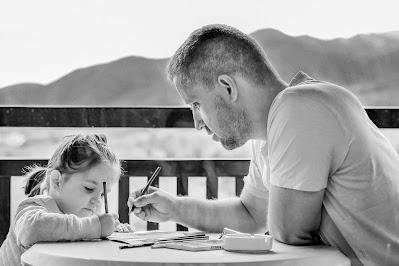Patience in parenting
- Get link
- X
- Other Apps
Patience in parenting is the ability to respond to our children with calm and understanding, rather than reacting with frustration or anger. It is about taking the time to understand our children's perspective and needs, and being able to respond to them in a way that is both loving and firm. Patience is an essential quality for any parent to have, as it helps to create a positive and supportive environment for children to grow and thrive in.
The importance of patience in parenting cannot be overstated. Children are constantly learning and growing, and they often require a great deal of guidance and support from their parents. Without patience, parents may become easily frustrated and overwhelmed by the demands of parenting, which can lead to a negative and hostile environment for children. On the other hand, parents who are patient and understanding are able to create a safe and nurturing environment for their children, which helps them to develop the skills and confidence they need to succeed in life.
Patience is not the same as tolerance or forbearance. Tolerance refers to the ability to put up with something, even if it is unpleasant or uncomfortable. Forbearance is about being able to delay gratification or hold back from taking action. Patience, on the other hand, is about being able to respond to our children with understanding and compassion, even when they are behaving in ways that are difficult for us. This type of patience is essential for building positive and supportive relationships with our children.
The role of patience in child development is also significant. Children who grow up in an environment where they feel understood and supported by their parents are more likely to develop healthy emotional intelligence. They learn how to regulate their emotions, how to communicate effectively, and how to make good decisions. On the other hand, children who grow up in an environment where they feel constantly criticized or dismissed may struggle with self-esteem and may have difficulty developing healthy relationships.
There are many benefits of patient parenting. One of the most significant is improved communication and relationship building with children. When parents are patient, they are able to listen to their children with understanding and compassion, which helps children to feel heard and valued. This type of communication promotes trust and mutual respect in the parent-child relationship.
Patient parenting also helps children to develop emotional intelligence. Children who grow up in a supportive and nurturing environment are more likely to learn how to regulate their emotions, communicate effectively, and make good decisions. This sets them up for success in all areas of their lives.
Patient parenting can also reduce stress and anxiety for both parents and children. When parents are able to respond to their children with patience and understanding, they are less likely to become frustrated or overwhelmed by the demands of parenting. This can help to create a more peaceful and harmonious home environment. Furthermore, when children feel understood and supported by their parents, they are less likely to experience anxiety and stress.
Another benefit of patient parenting is improved behavior and decision-making in children. Children who feel understood and supported by their parents are more likely to make good decisions and behave responsibly. They are also more likely to be able to regulate their emotions and make positive choices in difficult situations.
Developing patience as a parent takes time and effort. One of the most effective ways to do this is through mindfulness and self-awareness techniques. Mindfulness is the practice of paying attention to the present moment without judgment. It can help parents to become more aware of their own thoughts and emotions, which can help them to respond to their children with more patience and understanding.
Setting realistic expectations for children's behavior is also important. Parents who have unrealistic expectations of their children may become easily frustrated and disappointed when their children do not meet these expectations.Is there a difference between patience and forbearance
Patience and forebearance are often used interchangeably, but they do have distinct differences. Patience refers to the ability to respond to difficult situations or people with calmness, understanding, and tolerance. It is about being able to delay gratification and not becoming easily frustrated or angered. Forebearance, on the other hand, is about being able to delay action or hold back from taking action, even when faced with a difficult situation or person.
One of the main differences between patience and forebearance is the focus. Patience is focused on the present moment and how to respond in a calm and understanding way. Forebearance, on the other hand, is focused on the future and the ability to delay action or hold back from taking action. For example, a parent who is practicing patience with their child may respond to a tantrum with empathy and understanding, while a parent who is practicing forebearance may choose not to discipline the child in that moment, but instead wait until they have cooled down and can have a more productive conversation.
Another difference between patience and forebearance is the emotional state. Patience is about being able to respond to difficult situations with a calm and level-headed attitude, while forebearance is about being able to delay action or hold back from taking action, even when faced with difficult emotions. For example, a person who is practicing patience may be able to respond to a rude customer with kindness and understanding, while a person who is practicing forebearance may choose not to respond to the customer's rudeness in the moment, but instead wait until they can respond in a more measured and appropriate way.
Patience and forebearance are both important qualities to have, but they serve different purposes. Patience is essential for building positive and supportive relationships, while forebearance is important for making good decisions and taking appropriate action. Both patience and forebearance can be developed and strengthened through practice. Mindfulness and self-awareness techniques can be helpful for developing patience, while setting realistic expectations and learning to delay gratification can be helpful for developing forebearance.
The Benefits of Patient Parenting
Patient parenting is the ability to respond to our children with calm and understanding, rather than reacting with frustration or anger. It is about taking the time to understand our children's perspective and needs, and being able to respond to them in a way that is both loving and firm. Patience is an essential quality for any parent to have, as it helps to create a positive and supportive environment for children to grow and thrive in.
The benefits of patient parenting are numerous and wide-ranging, and they can have a positive impact on both parents and children. One of the most significant benefits of patient parenting is improved communication and relationship building with children. When parents are patient, they are able to listen to their children with understanding and compassion, which helps children to feel heard and valued. This type of communication promotes trust and mutual respect in the parent-child relationship, and it can also help to resolve conflicts and misunderstandings more effectively.
Another benefit of patient parenting is increased emotional intelligence in children. Children who grow up in a supportive and nurturing environment are more likely to learn how to regulate their emotions, communicate effectively, and make good decisions. This sets them up for success in all areas of their lives, and it can also help them to form healthy relationships and handle difficult situations in the future.
Patient parenting can also reduce stress and anxiety for both parents and children. When parents are able to respond to their children with patience and understanding, they are less likely to become frustrated or overwhelmed by the demands of parenting. This can help to create a more peaceful and harmonious home environment, and it can also help parents to cope with the stress and demands of everyday life. Furthermore, when children feel understood and supported by their parents, they are less likely to experience anxiety and stress, which can have a positive impact on their mental health and well-being.
Another benefit of patient parenting is improved behavior and decision-making in children. Children who feel understood and supported by their parents are more likely to make good decisions and behave responsibly. They are also more likely to be able to regulate their emotions and make positive choices in difficult situations. This can help to prevent problem behaviors and can also help children to develop the skills they need to succeed in life.
Patient parenting can also help children to develop self-esteem and confidence. Children who feel understood and supported by their parents are more likely to have a positive self-image, and they are also more likely to have the confidence they need to pursue their goals and dreams. This can have a positive impact on their academic and social success.
Patient parenting can also improve the quality of the parent-child relationship. When parents are able to respond to their children with patience and understanding, they are more likely to be able to connect with their children on a deeper level. This can help to create a stronger bond between parents and children, which can have a positive impact on the entire family.
Patient parenting is an essential quality that can have a positive impact on both parents and children. The benefits of patient parenting include improved communication and relationship building with children, increased emotional intelligence in children, reduced stress and anxiety for both parents and children, improved behavior and decision-making in children, development of self-esteem and confidence, and improvement of the parent-child relationship. Developing patience as a parent takes time and effort, but the rewards are well worth it. With patience, parents can create a positive and supportive environment for their children to grow and thrive in.
Developing Patience as a Parent
Mindfulness, self-awareness, classes, therapy, and support groups can all be valuable tools in developing patience as a parent.
Mindfulness is the practice of being present and fully engaged in the current moment, rather than dwelling on the past or worrying about the future. When applied to parenting, mindfulness can help a parent stay present and fully engaged with their child, rather than getting caught up in their own worries and frustrations. This can lead to greater patience, as the parent is better able to stay focused on the task at hand and respond calmly to their child's needs.
Self-awareness is the ability to understand one's own emotions, thoughts, and behaviors. As a parent, self-awareness can help you identify your own triggers and patterns of behavior that may contribute to feelings of impatience. By becoming more aware of these patterns, you can work to change them and develop more patience.
Classes, therapy, and support groups can also be useful in developing patience as a parent. Classes on parenting, child development, and mindfulness can provide valuable information and strategies for managing difficult situations and staying calm. Therapy can help a parent work through personal issues that may be contributing to feelings of impatience, and support groups can provide a safe and supportive space to discuss challenges and share strategies for coping with difficult situations.
Developing patience as a parent requires a combination of self-awareness, mindfulness, and the support of others. By utilizing these tools and resources, parents can work to identify and change patterns of behavior that contribute to feelings of impatience, and learn strategies for staying calm and present in the face of difficult situations. With patience, parents can develop stronger and more positive relationships with their children, and provide a more supportive and nurturing environment for their children to grow and thrive.
Overcoming Common Challenges to Patience in Parenting
Patience is a vital quality for any parent to have, as it enables them to handle difficult situations calmly and effectively. However, it can be challenging to maintain patience in the face of constant demands and stressors that come with parenting. Some common challenges to patience in parenting include:
Lack of sleep: When parents are sleep-deprived, they are more likely to become irritable and short-tempered, making it harder to maintain patience. To overcome this challenge, it's essential to prioritize sleep and create a bedtime routine that allows for adequate rest.
Constant demands: Parenting can be demanding, and it can be easy to become overwhelmed by the constant needs of children. To overcome this challenge, it's essential to set boundaries and prioritize self-care. This can include taking time for yourself, delegating tasks to others, and seeking support from friends and family.
Stress and anxiety: Parenting can be stressful, and stress and anxiety can make it harder to maintain patience. To overcome this challenge, it's essential to practice self-care, such as exercise, meditation, and therapy.
Lack of control: Parents may feel like they have little control over their children's behavior, which can make it challenging to maintain patience. To overcome this challenge, it's essential to focus on the things that you can control, such as setting boundaries and creating a consistent routine.
Unrealistic expectations: It's easy to get caught up in the idea of the "perfect parent," which can lead to disappointment and frustration. To overcome this challenge, it's essential to let go of unrealistic expectations and focus on being the best parent you can be.
Lack of community support: Raising a child can be isolating, especially for parents who are feeling overwhelmed. To overcome this challenge, it's essential to seek out community support through parenting groups, online forums, or support networks.
Difficulty in understanding the child: Some children may have a harder time expressing themselves than others. In this case, it's essential to try and understand the child's perspective and to actively listen to them.
Unclear communication: Miscommunication can lead to frustration and lack of patience, it's essential to establish clear communication with the child, whether it is verbal or non-verbal.
To overcome these challenges, it's essential to practice self-care, set boundaries, prioritize sleep, focus on the things that you can control, let go of unrealistic expectations, seek out community support, try to understand the child's perspective, and establish clear communication. Additionally, it may be helpful to seek out resources such as parenting classes or therapy to help you develop strategies for maintaining patience in the face of the challenges of parenting.
Patience is a vital quality for any parent to have, but it can be challenging to maintain in the face of constant demands and stressors that come with parenting. However, by understanding the common challenges to patience in parenting, and implementing strategies to overcome them, parents can become better equipped to handle difficult situations calmly and effectively.
- Get link
- X
- Other Apps



